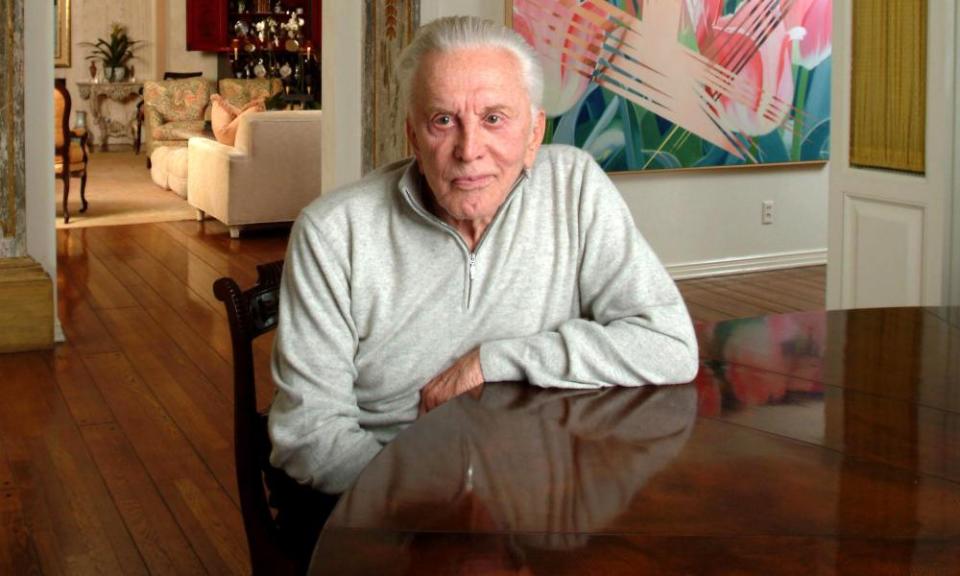When I met Kirk Douglas, did I ask if he’d assaulted Natalie Wood? No, and here’s why

Just over three years ago, I walked into a house in Beverly Hills to meet a man I’d wanted to interview for more than a decade. I am the inverse of ageist when it comes to dream interviewees: the older the better, in my book, because older people have more to say, and better stories. So I was especially excited because it’s hard to find older than Kirk Douglas was then: a nice, round 100 years. We chatted for about 45 minutes, at which point he got tired and I left. Afterwards, I texted a friend to tell her about my brief brush with Hollywood’s Golden Age. She replied immediately: “Did you ask him if he raped Natalie Wood?”
I hadn’t, for reasons I’ll get to. But I was surprised that that was her first thought, because I’d assumed it was a fairly niche internet rumour. I didn’t think much more about it, wrote up the piece and that was that.
Last week, when Douglas died aged 103, it was fascinating to watch the online reaction ebb and flow. First there were the fans, linking to his most famous movies, talking about his stand against the McCarthy blacklist. But these were followed swiftly – more swiftly than I’d ever seen before – by the defiant rebels, insisting we would be failing humanity if we didn’t acknowledge that Douglas was “a rapist”. Anyone who objected was, they claimed, clutching their pearls over logistical niceties. “Too soon?” was a typical tweet, above a photo of Wood.
This question, of how quickly a person’s problematic past can be mentioned after death arose just the week before, when the basketball star Kobe Bryant died in a helicopter crash, with his teenage daughter and seven others. A Washington Post reporter, Felicia Sonmez, posted a link to an article about the 2003 case in which Bryant was charged with sexually assaulting a 19-year-old woman. He ended up settling and made a non-apology apology, saying he was sorry but he had thought the sex was consensual. Yet referring to this undisputed fact about Bryant’s past, on the day he died, was for some utterly de trop. Even though the New York Times’ coverage of Bryant’s death included a reference to the case, the Washington Post’s executive editor told Sonmez her decision to tweet about it “was hurting this institution” and she was suspended. After an outcry from her colleagues, she was reinstated.
I’m afraid I lost the etiquette book that details precisely how many days we must wait after someone’s death before mentioning an accusation of sexual assault. Off the top of my head, it can be referred to – ooh – immediately, and I’m bewildered that this is even an issue. After Harvey Weinstein dies, people won’t spend the first 48 hours reverentially discussing Good Will Hunting; the idea that Roman Polanski’s conviction for statutory rape in 1977 won’t be mentioned in the first paragraph of his obituary is laughable. So no, I didn’t think it was too soon to mention Natalie Wood after Douglas died.
But I did think it wasn’t reasonable. I didn’t ask Douglas about the allegations because, having looked into the story, I could not justify doing so. Wood’s rape was mentioned in her biography, with Douglas, among others, whispered as a suspect. But how many of the people commenting so certainly about Douglas’s guilt know that the rumour about him really took root in 2012, when an anonymous commenter – who hinted that he was Robert Downey Jr, something Downey’s representatives quickly denied – posted, then deleted, the claim on a gossip blog?
As foundations on which to build cases go, this one is quicksand. Wood’s sister, Lana, has said that her sister was raped when she was 16 by a “big star” and maybe that was Douglas, but maybe it wasn’t. None of us know because – in contrast to the Bryant case – neither the alleged victim nor the alleged perpetrator ever said anything about it publicly, and nor has anyone else.
Related: It’s easy to dismiss boomers as know-nothings – but they got some things right, OK?
Now Douglas is dead, and people can say what they like. But this rush to damn feels as if it’s coming from three places. First, as a corrective to the traditional whitewashing of the famous and the dead. As recently as 2017, references to Chuck Berry’s various infractions – including serving time for taking a 14-year-old girl across state lines “for immoral purposes”, and accusations that he installed a video camera in the women’s toilet of his restaurant – were reluctantly squirrelled in after the tributes when he died. Second, post #MeToo, people want to be on the right side of history, and to some that means instant condemnation. Finally, there is a satisfaction in toppling the heroes of your parents’ (or grandparents’) era, as it shows how much more enlightened you are. We come not to bury our elders, but to trash them.
It is laudable that people wish to show support for sexual assault victims and, sure, damn the rapists before they’re cold. But an anonymous deleted blog is pretty feeble scaffolding on which to hang a crime as heavy as rape. Not all cases are the same, and making casual allegations is easy yet self-defeating. Learning to accept ambiguities is frustrating but fair.

